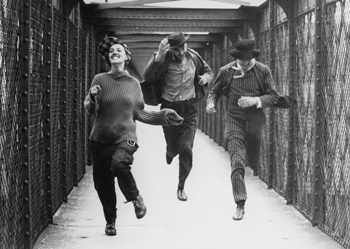What Makes New Wave?
 Although
inspired by neo-realism and by American pulp fiction, New Wave
directors focused on individuality of artistic vision.
Each director tried to approach his subject in as original way as
possible. This inspired a conscious striving for greatness. Directors pushed the boundaries of filmmaking.
Although
inspired by neo-realism and by American pulp fiction, New Wave
directors focused on individuality of artistic vision.
Each director tried to approach his subject in as original way as
possible. This inspired a conscious striving for greatness. Directors pushed the boundaries of filmmaking.
Themes of New Wave were often strongly existential,
stressing oddity and absurdity of life.
Next: Jean Luc Godard
 New Wave films tended to take their look from
neo-realism: non-studio, unpolished, the use of on-site locations,
use of amateurs. However, they often used non-sequential time,
camera motion designed to track a character's consciousness, intense
and direct conversation about politics or philosophy. Many
were shot on extremely low budgets. Friends and neighbors played important production
roles.
New Wave films tended to take their look from
neo-realism: non-studio, unpolished, the use of on-site locations,
use of amateurs. However, they often used non-sequential time,
camera motion designed to track a character's consciousness, intense
and direct conversation about politics or philosophy. Many
were shot on extremely low budgets. Friends and neighbors played important production
roles.
The idea of Hollywood continuity style was
to make viewers forget that they were watching a film. New
Wave filmmakers often did exactly the opposite. They used
disjointed images, attempts to show disunity, odd changes of
character, the use of people on the street, and other devices to
constantly remind the audience that it was watching a film.
 Although
inspired by neo-realism and by American pulp fiction, New Wave
directors focused on individuality of artistic vision.
Each director tried to approach his subject in as original way as
possible. This inspired a conscious striving for greatness. Directors pushed the boundaries of filmmaking.
Although
inspired by neo-realism and by American pulp fiction, New Wave
directors focused on individuality of artistic vision.
Each director tried to approach his subject in as original way as
possible. This inspired a conscious striving for greatness. Directors pushed the boundaries of filmmaking. New Wave films tended to take their look from
neo-realism: non-studio, unpolished, the use of on-site locations,
use of amateurs. However, they often used non-sequential time,
camera motion designed to track a character's consciousness, intense
and direct conversation about politics or philosophy. Many
were shot on extremely low budgets. Friends and neighbors played important production
roles.
New Wave films tended to take their look from
neo-realism: non-studio, unpolished, the use of on-site locations,
use of amateurs. However, they often used non-sequential time,
camera motion designed to track a character's consciousness, intense
and direct conversation about politics or philosophy. Many
were shot on extremely low budgets. Friends and neighbors played important production
roles.